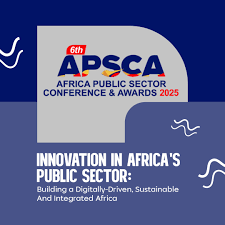By Kwame Bediako
Copyright gbcghanaonline

By: Kwame Bediako
The 6th Africa Public Sector Conference and Awards (APSCA 2025) opened in Cape Town, South Africa, under the theme “Innovation in Africa’s Public Sector: Building a Digitally Driven, Sustainable and Integrated Africa.”
The three-day event, running from Tuesday, October 7 to Thursday, October 9, brought together top government officials, policymakers, and innovators to discuss the future of governance on the continent.
Ghana’s Chief of Staff, Julius Debrah, was among the listed keynote speakers but was represented by Deputy Presidential Spokesperson, Shamima Muslim.
Delivering the keynote address on behalf of Julius Debrah, Shamima Muslim highlighted Africa’s historical journey toward renewal and transformation in governance.
She referenced Nelson Mandela’s 1990 speech from the Cape Town City Hall, describing it as symbolic of Africa’s enduring spirit of reinvention.
“Just like our freedom fighters of yesteryears, we have gathered to reimagine a new era for Africa’s public sector where institutions deliver, adapt, and inspire,” she said.
She further emphasized that APSCA had become one of the continent’s most vital convenings for exploring new approaches to governance and institutional transformation.
“This gathering of diverse minds reminds us that the public sector remains the backbone of Africa’s development ambitions,” she remarked.
She noted that Africa’s population, projected to reach 1.7 billion by 2030 with over 60% under 25, represents both a challenge and an opportunity for governments to deliver innovation and accountability.
Highlighting Africa’s progress, she cited several public sector reforms across the continent, including South Africa’s National Health Insurance scheme, Rwanda’s Irembo digital platform, and Kenya’s Huduma Centres.
She also praised Ghana’s National Identification System, which she said has become the foundation for business and public services, adding that the government’s 24-hour economy initiative has improved access to critical services such as ports, licensing, and passport operations.
Shamima Muslim added by stressing that despite notable advancements, Africa must strengthen institutional coherence and rebuild public trust to sustain progress.
“While leadership, technology, and citizen engagement converge to drive change, challenges such as bureaucratic inefficiency and weak citizen trust continue to undermine institutional effectiveness,” she stated, calling for sustained innovation and collaboration across the continent’s public sectors.